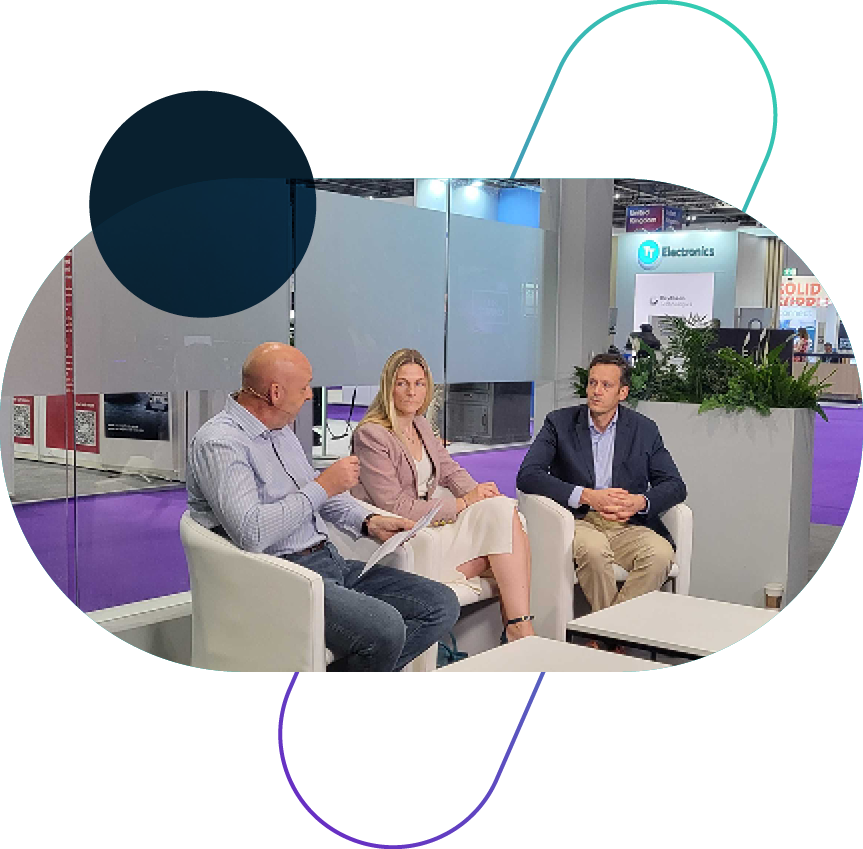
DSEI Connect 2023
Forging a Stronger Future
Developing a GCAP SME ecosystem approach that delivers value creation for all participants
Below is a transcript of a TV studio recorded Fireside Chat between John Ridge, Ministry of Defence and Kate Robertson, BAE.
The Fireside Chat was facilitated by Andrew Webber of UK technology SME, Whitespace, and was recorded at the Defence event, DSEI, on September 13th and was broadcast on September 14th to all the attendees at DSEI.
Post-DSEI, the TV recording of the Fireside Chat is available HERE.


Andrew Webber, Whitespace
Hi and welcome to this Connect session on Forging a Stronger Future, developing a GCAP SME ecosystem approach that delivers value creation for all participants. Firstly, I'd like to introduce our guests for this Fireside Chat - Kate Robertson from BAE and John Ridge from the MoD.
Kate Robertson, BAE
Thank you, Andrew. So, good morning. So I am Kate Robertson. So I'm the Enterprise Enablement Director at BAE systems for FCAS and GCAP. What that means is essentially I'm responsible for supporting the team to put in place everything we need to get the programme delivered and to make sure that we deliver the future 6th gen capability.
John Ridge, Ministry of Defence
I'm the Innovation Director in the Ministry of Defence. There are two parts of the organisation that effectively work to me. One is the Innovation Unit, Defence Innovation Unit, which does strategy, policy and manages our portfolio of about £100 million a year we put into innovation. And the other part is the Defence and Security Accelerator (DASA), which finds and funds good ideas from industry and joins them up with operational users out in the Frontline Commands. And we've worked with, well, starting to work very closely with Richard Berthon and his team in FCAS to see what we can do about bringing innovation and particularly SMEs, into the supply chain of FCAS.
Andrew Webber, Whitespace
Brilliant. And of course, I should introduce myself. So I'm Andrew Webber, I'm the Chief Marketing Officer for a Defence SME called Whitespace and we're an innovation advisory and software engineering company based in the UK.
So with that, I'll go to my first question, starting with yourself, John. In your role as Director of Defence Innovation, you have Frontline Command innovation functions such as JHub and others that you've already mentioned as a direct connection into the UK SMEs, bringing Defence security and intelligence problem sets to them. What more can be done, in your opinion? Or what changes would you want to make so the MoD and the SME ecosystem work even better with the aspiration of creating value for everyone?
John Ridge, Ministry of Defence
Yeah, it's a really good question. I spent yesterday morning visiting some of the stands here and talking to SMEs and the sort of higher tier suppliers about what it's like to operate with Defence and it was really interesting talking to them and this isn't the first time I've heard these frustrations. They find us sometimes quite difficult to engage with. There are multiple points of entry into Defence, they find that we're quite bureaucratic and there's a lot of delay. The bureaucratic burden for doing business with us in terms of the amount of paperwork they need to do to get onto frameworks and things, I think is a significant barrier. I think it's felt specifically by the SMEs because if you are a very large company, you've got the capacity to absorb that delay because you've got the cash flow, you've got the capacity to absorb that bureaucracy because you've got big teams that can do it. But if you're sort of, I don't know, half a dozen people, relatively new business, that's a really significant chunk of your time that you're doing just to be kind of part of the game. So we're looking at a number of ways that we can try and reduce that.
So I'm really keen to push DASA, in particular, as a front door. There's a stand here at the DSEI which I hope people get the chance to go and visit. That's a really good entry point into Defence. It allows you to get into our systems. Once you've got your idea to DASA, that then goes onto a database so that if we, in future, need to come to it, we can then find those ideas and exploit them. So there's a whole series of things we're doing, and particularly around commercial and contracting - we've got a programme called Commercial X, which is a way of trying to reduce the burden of that sort of commercial challenge of working with MoD. So there's a whole series of initiatives, many of which I hope that we can kind of pull across into the FCAS programme as well.
Andrew Webber, Whitespace
Perfect, thank you very much. And I will say that Whitespace was recently successful with the DASA grant submission. So I would echo the comments you've just made.
Kate BAE is, of course, one of the world's largest Defence primes. You have the potential to be a great enabler as an organisation for SMEs to participate in significant contracts, where perhaps barriers to entry are greater, as part of a consortium, but also to provide access via frameworks that you are already on. In addition to this, of course, as BAE yourself, you are a potential customer for SMEs. Likewise, for example, do you think you guys have cracked the secret code in finding and working with SMEs successfully?
Kate Robertson, BAE
It's a really good question. So when looking at a secret code, do I think we've got it absolutely spot on? No. Are we looking at doing things differently in FCAS and really building that? Absolutely, yes. So within the programme we are already working with 500 organisations from across different industries, not just within Defence and, in there, we include over 90 SMEs and 20 universities. So we have already built that big ecosystem that we need to deliver a 6th gen capability. And the reason it's so important is because the idea of ecosystem is at the very core of FCAS. A 6th generation capability will have advanced technologies such as sensors, low observability, but the magic will really happen when we are able to process, integrate and bring the data together from across a wide variety of sources to be able to make decisions and execute it.
Now, building that ecosystem for delivery requires a completely different ecosystem to support it long term, we need the flexibility and adaptability that comes from having a really robust SME ecosystem. So we are really looking on FCAS to be able to drive that and not just drive it in terms of we've got this many people we're working with and we're ticking those boxes, but really focus on how we pull that into the programme in a way that creates value for the programme, but also value for the long term prosperity of the defence SME ecosystem. For that, it's absolutely critical that we capitalise on things that John's team is doing, in particular things like commercial X, because it is one of the biggest frustrations that we have and that SMEs come to us with in terms of ways of working. So I am really excited about how we drive this forward in partnership together.
Andrew Webber, Whitespace
Perfect. Thank you Kate.
John Ridge, Ministry of Defence
Just picking up very quickly on one of the points that Kate made. So this bit about SMEs and prosperity is really important. So the Defence mission to secure the nation and help it prosper, I think we've got a key role to play in terms of nurturing that ecosystem, helping those SMEs grow, because they are a huge part of the national economy. So there's definitely, the more that we can do, see that it's not just about the operational outcome of having really high-end capabilities on the platform, it's also about what you're doing for your industrial base. So that's something we're very keen to support.
Andrew Webber, Whitespace
So you both attended and presented at the FCAS Innovation Showcase on May 25th down at MoD Abbey Wood. There was much discussion then, and since, about the challenges being faced in developing an SME ecosystem. You've already touched on some of these, so you may want to revisit and add more colour, both for industry consortium within the FCAS Group and how these were very similar to the challenges being seen within the MoD more widely, but also within your own organisation as well.
John, this has led to an agreement between the FCAS industry partners and your Innovation Directorate, around collaborating in both this year and next, on how more effectively you can work with SMEs and collectively work through the operating model that is needed and the blockers that need to be overcome. Speaking as an SME on the sort of other side of the fence, if you will, working into Defence and engaging regularly with other Defence SMEs, I would share some of the following challenges that we experience and we also hear you've touched on some of them, but perhaps we can revisit these and, of course, add to them.
So, for example, not an exhaustive list: You can be very hard to engage with and then work with. I think both of you hinted at that. You can be very slow to respond with what feels like horribly protracted, tendering processes. For a small organisation, the sheer number of frameworks and contracting routes is mind-boggling and we're still getting our heads around it and we're on quite a few frameworks. The risk flow-down. Asking an SME to accept a level of risk is very different to asking a large prime, for example, to undertake the risk penalties. And then it feels this isn't necessarily reality, but it does feel like there's a closed community of existing supply-chain and it's very hard for new entrants to break into. Feel free to disagree and challenge, by the way, or indeed support those comments or add to them. Kate, perhaps first…
Kate Robertson, BAE
Yeah, no, I think all of those challenges, John and I will probably recognise all of them in terms of the conversations that we have with SMEs and we need to do more to support that. And it's a real tightrope, because when we're talking about building prosperity, part of that is having a robust SME ecosystem that can provide for Defence and meet the security and regulation aspects that we absolutely need to protect in Defence. That's where I see our role as a Defence prime being very important because we know how to meet those barriers to entry for Defence and therefore what we need to do is support the SME ecosystem to access these large programmes and to be able to pull that through. Now, one of the biggest challenges that I see from an SME perspective is that clarity; where do they go? And that's one of the reasons why we're looking at this partnership at the moment. Because SMEs will look at the Tempest programme and the UK industry partners and there are essentially lots of doors to entry there. And then look at defence innovation and there's doors to entry there too.
So by forming this partnership and working together to try and drive this, we are trying to simplify and streamline that process so that we are running these challenges together, as well as drawing on the best of the ecosystem. I think one of the other things that is really important is having that continual challenge. So having people re-emphasize that to us all the time on a large capability programme, sometimes it can be very hard to lift your head up and out of the programme, and that's what we need. That's why the diversity of the SME ecosystem is also really important. So I think, from my perspective, the challenges are absolutely recognised and we need to do more to streamline those and make them easy. But I really want to get the message out there to SMEs that we do really want this to work and to work with you. So sometimes bear with us a bit, because we're working through some of the processes and we promise that we will get there in the end.
Andrew Webber, Whitespace
John?
John Ridge, Ministry of Defence
I agree with everything Kate said. I think the important thing is not to make this the SME’s problem. This is not for them to solve, that's for us in terms of the combination of Industry and Ministry of Defence working together. I think if you look at the Defence Command paper, the chapter on Industry is a really clear statement of intent about how we're going to do this differently. We're going to form a new sort of partnership, we're going to try and get away from what has historically been quite a sort of competitive, adversarial approach of it's all around the contract to something which feels much, much more like a partnership. And that's certainly what I'm seeing in terms of FCAS at the moment, because if you've got MoD and the Industry Primes, the consortium working really closely together, that will make it much easier for the SMEs to engage. I would bring out, and I think your point on security is really important. What we need to do, the only way we're going to get the full value out of the SME’s, is by bringing them in very early, not as we've got a specification for a sub-component that we need you to go and manufacture.
The only way we're going to tap into their creativity is by saying, “hey, come in, see the problems we've got in the programme, see the things we're trying to achieve. What have you got?” Or “What ideas have you got that you can help us solve that?” That means engaging them early and naturally, we're a bit uncomfortable with that. If these are small companies that we haven't got a pedigree of dealing with, and to a certain extent, we need to take a bit more risk on that. That means getting that problem to them quickly so that they can come up with a solution. And there are some really kind of prosaic challenges around what information systems to use, how do we get them so that they can interact in a way that allows us to be confident that we're preserving the security of the programme? Because that's very important at the same time as being as transparent as we can with that sort of further down the supply chain so that we can tap into their creativity.
Andrew Webber, Whitespace
I would echo those points and add to them. I think there is a responsibility on SMEs and smaller SMEs, including Whitespace, for example, in that it's value creation for all. So be clear about, yes, what you can bring to the MoD bring to BAE, or indeed the FCAS Primes, as much as what you think they can bring to you. It's that value exchange. But also, I love that idea, John, and I live by myself. Getting in early without a defined set of requirements allows us to be far more creative collectively. But also there's an onus, I think, on the SME, to be honest and say we're not the right solution for you as well, rather than try and do a square peg into a round hole. But no, thanks very much indeed for that. Both of you. So we're moving to final questions and closing remarks.
But just before I get to the final question, a little bit of a plug for all our viewers. There will be an FCAS SME Ecosystem summit planned on October 2nd, with representation from industry partners such as BAE, but, the other industry partners within the consortium, plus John's organisation, and the wider innovation units from across the MoD. And, if that wasn't enough, also some of the SME membership organisations, such as ADS, TechUK, to name a few, and some of the SMEs themselves, because this is a capability, a programme and approach that needs to be driven collectively.
So please contact myself, or indeed Kate or John if you want any more details on that. But we'd like active engagement from any of those organisations that I mentioned above, because these are big problems to solve. It's in everyone's interest to help solve them, but let's do that collaboratively rather than in a stovepipe.
So, with that, we'll move to the final question and I'll start with yourself, Kate, if I may. If I was to ask you to select just one thing that you are most excited to see as an output from the collaboration between the FCAS consortium and John's organisation, what would that be?
Kate Robertson, BAE
Oh, just one thing is quite difficult. I think. For me, the technology is always really interesting. Things like quantum sensing, quantum computers, advanced sensors and advanced weapons are always a really interesting space. But for me, if it comes down to one thing, it has to be about the people. What we're looking to create in this programme and going forward, it's estimated we'll be supporting 21,000 jobs a year across the ecosystem is about how do we really develop those skills that we need to drive that prosperity that John was talking about. And the way we need to do that is through empowering our people. So empowering the ecosystem and the accessibility that we refer to there through using technology in terms of delivering that security, but also empowering our people to learn and work better with technology. Now, in that space, we've got a lot of challenges that we don't necessarily know how to solve. And so actually putting some of those challenges out to the ecosystem, I think would be absolutely brilliant. It's why I love innovation and why I love these types of events that we're holding is you don't know what you don't know.
These events really give us that opportunity to engage with SMEs, not just from Defence, but from a wider ecosystem to actually help us learn what we don't know. So then we can start to get to the point of having no knowns rather than unknown, unknowns. So I think that's the bit that really excites me. It's accessing the people, it's empowering the people and it's how we do that to create a sustainable ecosystem going forward.
Andrew Webber, Whitespace
Brilliant. I love that focus on people. John, same question.
John Ridge, Ministry of Defence
Yeah, so I'm not going to directly answer your question, but I think, for me, I will feel excited if we pass a litmus test, which is that every part of Defence, the Prime Consortium and the SME community feel that they've been able to contribute their best ideas to the programme. That, to me, is how we know we've got it right. And that will be a feeling rather than some specific metric. So, do they feel that they've been able to fully engage with it? Do they feel that they've been brought in at the right stage because that's the way we'll know we've got the best out of it and that's good for industry, but also, crucially, that's good for us because we'll get the best capability out the back?
Andrew Webber, Whitespace
Great answer. Thanks, John. Thanks, Kate. So it just comes back to me, then, to really bring the proceedings to a close in the discussion. Thank you, Kate. Thank you, John, for your insights, your expertise, and your candor as well. That's appreciated. And thank you for not challenging me too much on some of the issues that we see as SMEs, but I think the key thing that I would take away from what we've heard here is genuine intent. Positive intent, genuine desire, not just rhetoric but a genuine action to work together, work collaboratively, demonstrate innovation, working through collaboration with the SME community to build a programme that I hope, like you say, John, drives lots of great outcomes around skills and people but, ultimately, that we hear back from the SME’s that this works, this is effective, this drives value for everybody within it and I've enjoyed the experience. That would be great to hear, but also, of course, true, for the MoD and companies like BAE to be saying the same thing. So thank you again and thanks, everyone for your time. Thanks.

Whitespace CMO
Andrew Webber
With over 25 years of experience in financial services, technology sector, public sector and advisory industries, he is a passionate and strategic programme, business, and marketing leader who thrives on creating and delivering value for customers, partners, and stakeholders.

BAE Head of Digital and Enablers
Kate Robertson

MoD Director Defence Innovation
John Ridge CBE
John left the Army in 2020 to join the Civil Service. He spent two years as Director of Strategy and Enterprise Services in Defence Intelligence, where he led transformation and corporate services. In March 2022, he moved to 10 Downing Street on a loan, leading transformation in No10. He returned to MOD in September as Director of Defence Innovation.

We’re a technology company with extensive expertise in product and service development, AI prototyping, and venture building. Our in-house processes and extensive partner ecosystem ensure that no matter your opportunity, we have a proven approach to meet your goals. By harnessing emerging digital technology, design thinking, and agile methodologies, we help organisations to be more innovative.